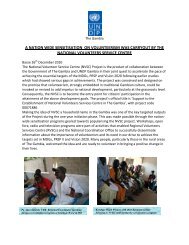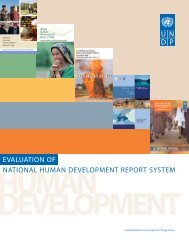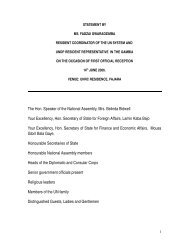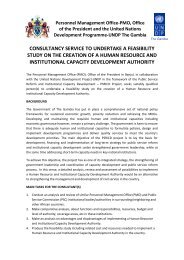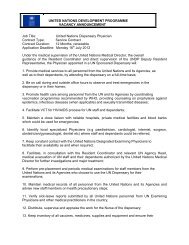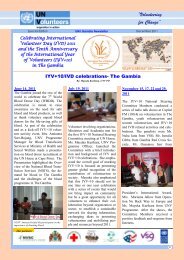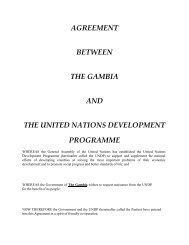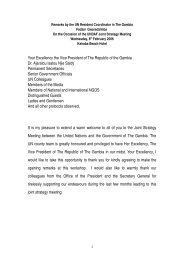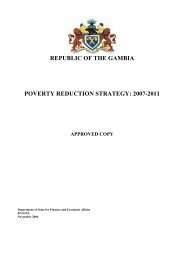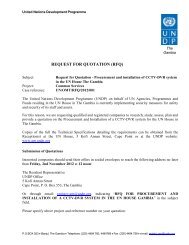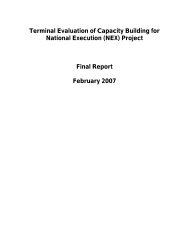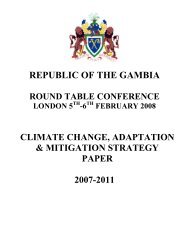Introduction - UNDP The Gambia
Introduction - UNDP The Gambia
Introduction - UNDP The Gambia
You also want an ePaper? Increase the reach of your titles
YUMPU automatically turns print PDFs into web optimized ePapers that Google loves.
________________________________________________________________________________________________________________________<br />
trained professionals, and weak support<br />
structures for the development of a<br />
manufacturing and processing sector.<br />
To address some of the constraints faced by<br />
the private sector, the following measures<br />
should be adopted:<br />
• Areas of private sector interventions, not<br />
only in terms of core business activities<br />
and social investment but also on policy<br />
initiatives and dialogue should be clearly<br />
defined. <strong>The</strong> dialogue should include the<br />
possibility of strategising the social<br />
investment of private sector companies to<br />
avoid randomness and to encourage<br />
concentration in priority areas identified<br />
by Government as critical for MDG<br />
attainment, as highlighted in the localised<br />
MDG Report. To promote the dialogue,<br />
the formation of task forces should be<br />
encouraged for the identification of<br />
intervention areas, and for the definition<br />
of measurable objectives.<br />
• <strong>The</strong> capacity building needs of the private<br />
sector should be made core objectives in<br />
government and donor-funded capacity<br />
building programmes. <strong>The</strong> sector should<br />
be made much more aware of the roles<br />
and objectives of the MDGs and the<br />
PRSP in Government’s development<br />
agenda. GICAP should play a more proactive<br />
role in implementing economic<br />
consultation summits and policy interface<br />
seminars.<br />
• <strong>The</strong> analysis in the Report reveals that<br />
SMEs and MFIs have the potential to<br />
reach vulnerable groups and can thus play<br />
a major role in the pursuit of poverty<br />
alleviation programmes. To enhance their<br />
impact on the MDGs, concrete steps<br />
should be taken to remove the bottlenecks<br />
which presently restrict their growth and<br />
development namely: limited financial<br />
resources, limited managerial and<br />
technical capacity, limited access to credit<br />
facilities and poor linkages with the<br />
formal sector.<br />
6.3 Civil Society<br />
<strong>The</strong> Report links the emergence of NGOs and<br />
CBOs in <strong>The</strong> <strong>Gambia</strong> to the existence of a<br />
gap left by the government and the private<br />
sector in terms of ensuring that the basic<br />
needs of the people are met. In filling this<br />
gap, NGOs have forged a strong partnership<br />
with the Government of <strong>The</strong> <strong>Gambia</strong> in the<br />
implementation of programmes towards<br />
achieving the targets of Vision 2020, the<br />
MDGs and PRSP goals.<br />
Considering that NGOs and CBOs are closer<br />
to the people and are organisations where<br />
more people have access to resources and<br />
power over choice, then developing their<br />
capacities to intervene more effectively in<br />
carrying out their activities will no doubt<br />
have more effect on the life of the average<br />
person. In addition, with the increased rolling<br />
back of the state in economic activities,<br />
NGOs/ CBOs and the private sector should be<br />
in a position to fill this gap. Besides, some of<br />
the PRSP objectives can only be achieved if<br />
the capacities of civil society organisations<br />
are built upon to expand their intervention.<br />
Capacity building efforts in the civil society<br />
sector have been severely restricted by the<br />
combined effects of the following:<br />
• lack of effective coordination at grassroot<br />
level<br />
• inadequate funding<br />
• poorly qualified staff<br />
• skewed investment in administrative<br />
infrastructure, at the expense of<br />
programme activities that are<br />
advantageous to beneficiaries.<br />
To address these deficiencies, the following<br />
measures should be implemented:<br />
• <strong>The</strong> capacity of NGOAA should be<br />
strengthened to enable the institution to<br />
effectively monitor the progress and<br />
activities of NGOs, to monitor their<br />
adherence to the established Code of<br />
Conduct, to evaluate the impact of NGO<br />
interventions on the lives of project<br />
beneficiaries and to develop the<br />
institutional capacities of less endowed<br />
national and local NGOs.<br />
________________________________________________________________________________________________<br />
Building Capacity for the Attainment of the Millennium Development Goals in <strong>The</strong> <strong>Gambia</strong> National Human Development Report 2005<br />
67



